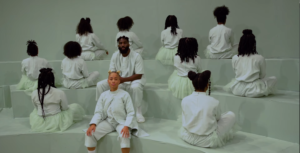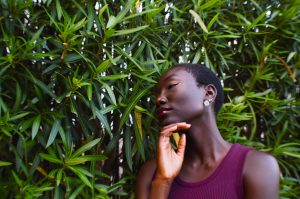Grace Wilson A Dark Skin Beauty(@_graciiieeeee_)
by Christine Okoro
Writer
I recently had the chance to interview Grace Wilson, a student at Houston Baptist University and a beloved dark skinned girl. She is a force to be reckoned with! Grace Wilson took me on a journey back to her adolescence about the time she was teased and mocked for her dark skin tone. She remembers being shamed by four African American boys in her choir class in the 6th grade.
“In the 6th grade in my choir class, there were a group of 4 African American kids who for some reason always wanted to pick on me because I was so dark. They teased me every single day of middle school. It would be little things that would hurt me. For instance, when the teacher turned off the lights to try to show the class a movie or something, kids would say ‘Oh where did grace go?’ or ‘Grace, your parents left you in the oven too long’ â€, Grace said.
Grace mentioned being called names such as ‘African Booty scratcher’, etc. She experienced the ignorance of kids making a mockery of her culture at a very young age. She remembers crying to her mother at home, telling her about the offensive comments other students said. Grace’s parents advised her to ignore it and not think of herself as less worthy or beautiful than her peers. Grace’s dad always stressed the benefits of her dark skin tone such as her aging gracefully, being immune to cancer, etc. However, Grace’s parents didn’t understand how these experiences affected her emotionally. Her African parents always stood by the phrase, ‘sticks and stones may break my bones, but words will never hurt me’.
Eventually, Grace’s mom went to the school to speak with the administration about the issue.
“I remember the school principal said, ‘But I don’t understand, you are all [Black Americans and Africans] the same’. She couldn’t understand why another black kid was making fun of another black kid,†Grace expressed.
The 6th grade class had to apologize to Grace. However, Grace says she never forgot the hurt and sorrow she felt in middle school. She considered bleaching her skin and growing her hair out to fit in with the others kids at school.
“Bleaching my skin crossed my mind. It was tempting because a lot of African women in my own family have bleached their skin and now their skin tone is like yours. The men marry these women, but when their kids come out looking as dark as these women were before, the men threaten to disown them,†Grace said.
Grace managed to overcome the thought and temptation of bleaching her skin. She ignored students’ rude comments and suppressed her emotions throughout her middle school years, which eventually led to her distinct hate and resentment for her own skin and Black American men.
“Like today I went to Texas Southern University. I got home at 4:40 and my heart was still pounding due to fear. There were a lot of black people around the campus in one setting, which frightened me. This emotion stemmed from me being treated as an outcast in middle school for be being African; I was just too different to fit in,†Grace said.
Grace admits that she is fearful of being teased again and being called names like she was as a child. She can’t fathom the thought of encountering the same experience again. Grace says that even when she hears laughter behind her, she automatically assumes that people are making fun of her skin.
Due to her childhood experiences, Grace felt ashamed of her skin tone and struggled to embrace her beauty. She started dating older men twice her age because she felt they were more mature. She knew that young boys couldn’t appreciate her skin tone and culture.
“I even like dating older Black men because when they see my skin, they think it’s so rich. They like it a lot,†Grace said.
The infatuation that older males had for Grace’s skin uplifted her self-esteem and gave her the validation she needed to feel beautiful. However, Grace knew that for self-love to be permanent and true, she could not depend on outside approval.
By her positive thinking and self-talk in the mirror, Grace learned to embrace her beauty. Grace says that she wrote positive phrases about herself on sticky notes and placed them on her wall. She also dedicates herself to a skin regime of exfoliating, moisturizing, and toning her skin.
“I have changed so much. Now, I hate getting marks or bruises on my skin. I even began to realize that my skin looks better than half the other girls I see with blemishes and acne on their skin and who have to wear makeup. And even going to the MAC stores and having workers tell me I don’t need makeup, made me feel good about myself,†Grace said.
If Grace could give advice to her younger self, she would emphasize how beautiful she really is and that she is worthy of love. Grace believes that beauty is more about the way one treats others. Her idea of beauty has nothing to do with personal image, but instead about having a good heart.
“I have dealt with people and children who are nasty and mean. But when I see someone whose heart is kind and who actually cares, it makes me stop and appreciate them so much. There is definitely evil in this world so when I see good people, it makes me happy,†Grace said.
Grace advises other women to look in the mirror and point out features they truly like about themselves. She wants them to love themselves for who they are and to not want to change anything because of society’s standards of beauty or what men may like.
I couldn’t agree more with Grace. Beauty is not defined by what men think. It is literally in the eye of the beholder. I know you have heard this phrase time and time again, well…start believing it because it’s true! Women should consider themselves as U.g.l.ay., which stands for unique, gorgeous, lovely and youthful and we shouldn’t allow others-not even ourselves to tell us otherwise.













